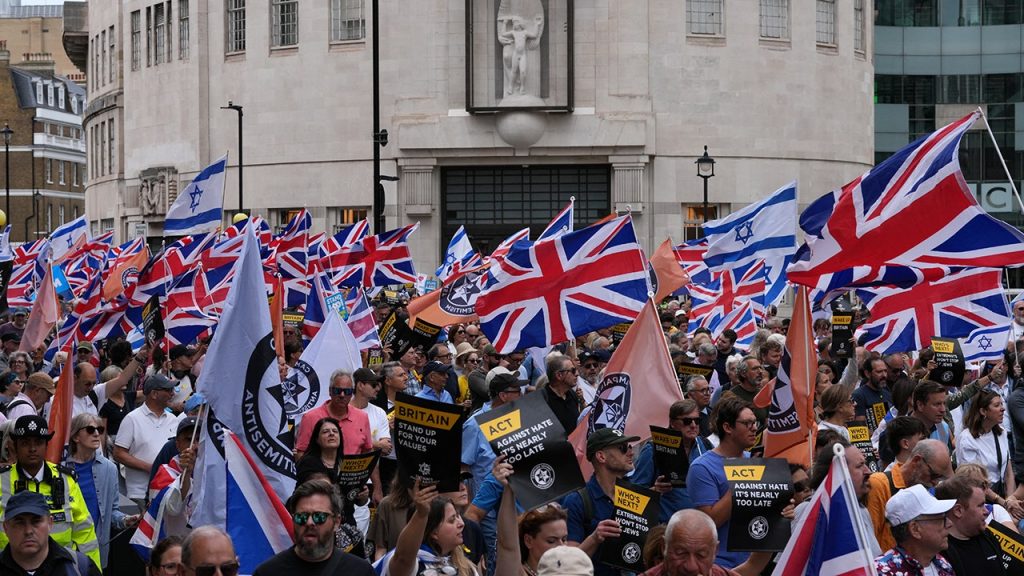British Government Under Fire for Ignoring Rising Antisemitism
In a powerful display of solidarity against the alarming rise of antisemitism in the United Kingdom, an estimated 70,000 people marched through London’s streets on Sunday. The demonstration, organized by the Campaign Against Antisemitism, highlighted a disturbing trend: antisemitic sentiments in Britain have nearly doubled since 2021, with 21% of British adults now affirming four or more antisemitic statements compared to just 11% three years ago. Despite the significance of this march, Prime Minister Keir Starmer’s left-leaning government faced widespread criticism for failing to send a senior representative, choosing instead to offer only a backbench peer at the last moment. This decision has left many British Jews questioning the government’s commitment to addressing what Britain’s Chief Rabbi Sir Efraim Mirvis described as “an explosion of hatred right across the UK.”
The surge in antisemitism has deep connections to pro-Palestinian activism that sometimes crosses into support for Hamas, the U.S.-designated terrorist organization responsible for the October 7, 2023, attack on Israel that killed approximately 1,200 people, including British and American citizens. The impact of this rising hatred on the Jewish community has been profound – half of British Jews have considered leaving the UK due to antisemitism since October 7, with this figure rising to two-thirds among young Jews. Only one-third of the community believes Jews have a long-term future in Britain. As one spokesperson for the Campaign Against Antisemitism poignantly stated, “Jews should not be made to feel they must leave Britain to be safe. It is the responsibility of the authorities to ensure that our community can live proudly and securely in this country.”
Further compounding concerns within the Jewish community was Prime Minister Starmer’s recent appointment of Shabana Mahmood as Home Secretary – the equivalent of America’s Secretary of Homeland Security. Mahmood has faced accusations of stoking anti-Israel sentiment through her activism, with critics like Nile Gardiner, director of the Margaret Thatcher Center for Freedom at The Heritage Foundation, describing her as “a far Left, Israel hating extremist.” This appointment has raised questions about the government’s stance on Israel and its commitment to protecting Jewish citizens at home. Starmer has already faced criticism from Israel’s government for his decision to recognize a Palestinian state, which Israel views as rewarding Hamas for the October 7 massacre rather than encouraging peace efforts.
The absence of senior government officials at Sunday’s march stands in stark contrast to the opposition and Reform UK parties, which sent high-ranking representatives to show solidarity with the Jewish community. “The decision not to send a proper representative was scandalous, and it will do nothing to reassure British Jews that this government has their back or even recognizes the scale of the crisis,” said a spokesperson for the Campaign Against Antisemitism. The organization had reached out to all major parties weeks in advance, hoping to ensure that the Jewish community would hear from high-ranking figures during this critical time when antisemitism in Britain has reached its highest levels in living memory.
Mass rallies against Israel in the UK have frequently generated antisemitic incidents, creating an atmosphere of fear and uncertainty for British Jews. The situation has become so dire that an Israeli minister told Fox News Digital last year that London has become “the world’s most antisemitic city.” Despite repeated requests for comment, Prime Minister Starmer’s office provided no substantive response to these concerns. Adding to the anxiety within the Jewish community is the UK government’s reluctance to designate Iran’s Islamic Revolutionary Guard Corps (IRGC) as a terrorist organization, unlike allies such as the United States, Canada, and Australia. A July British parliamentary report warned that Iran’s regime, which uses the IRGC for terrorist operations abroad, is actively seeking to kill and abduct individuals on British soil.
The march on Sunday represented more than just a protest against antisemitism; it was a plea for recognition and action from a government that many British Jews feel is failing them. “Sunday’s March Against Antisemitism was a powerful show of unity, with an estimated 70,000 people taking to the streets of London to stand shoulder to shoulder against the record levels of antisemitism blighting our country,” noted the Campaign Against Antisemitism representative. Yet the government’s tepid response has left many questioning its priorities and commitment. As Britain faces what the Campaign describes as a situation where “young people are being radicalized before our eyes and hatred is spreading unchecked,” the Jewish community’s call for decisive action grows more urgent by the day. The spokesperson’s warning rings clear: “At such a perilous time, the Jewish community needed to hear clearly from the government that it stands with us. Instead, the Prime Minister’s absence has left British Jews questioning whether this government is serious about confronting the hatred consuming our country.”


